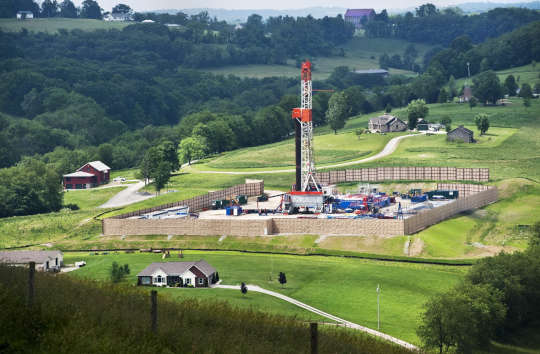
"Our findings lend support for increased awareness about cardiovascular risks of unconventional natural gas development and scaled-up heart attack prevention, as well as suggest that bans on hydraulic fracturing can be protective for public health," says Elaine Hill.
The Marcellus Formation straddles the New York State and Pennsylvania border, a region that shares similar geography and population demographics.
However, on one side of the state line unconventional natural gas development—or fracking—is banned, while on the other side it represents a multi-billion dollar industry.
Researchers took advantage of this “natural experiment” to examine the health effects of fracking and found that people who live in areas with a high concentration of wells are at higher risk for heart attacks.
Get The Latest By Email
“Fracking is associated with increased acute myocardial infarction hospitalization rates among middle-aged men, older men, and older women, as well as with increased heart attack-related mortality among middle-aged men,” says study senior author Elaine Hill, an associate professor in the University of Rochester Medical Center (URMC) public health sciences department.
“Our findings lend support for increased awareness about cardiovascular risks of unconventional natural gas development and scaled-up heart attack prevention, as well as suggest that bans on hydraulic fracturing can be protective for public health.”
Natural gas extraction, including hydraulic fracking, is a well-known contributor to air pollution. Fracking wells operate around the clock and the process of drilling, gas extraction, and flaring—the burning off of natural gas byproducts—release organic compounds, nitrogen oxide, and other chemicals and particulates into the air.
Additionally, each well requires the constant transportation of equipment, water, and chemicals, as well as the removal of waste water from the fracking process, further contributing to air pollution levels. Fracking wells remain in operation for several years, prolonging exposure to people who work at the wells sites and those who live nearby.
Instead of the typical single source of industrial air pollution, such as a factory or power plant, fracking entails multiple well sites spread across a large, and often rural, geographic area.
In 2014, there were more than 8,000 fracking well sites in Pennsylvania. Some areas of the state have a dense population of fracking wells—three Pennsylvania counties have more than 1,000 sites. Contrast that with New York State, which has essentially banned the process of hydraulic fracking since 2010.
Exposure to air pollution is recognized as a significant risk factor for cardiovascular disease. Other research has shown that the intensity of oil and gas development and production is positively associated with diminished vascular function, blood pressure, and inflammatory markers associated with stress and short-term air pollution exposure. Light and noise pollution from the continuous operation of the wells are also associated with increasing stress, another contributor to cardiovascular disease.
To measure the effect of fracking on cardiovascular health, researchers studied heart attack hospitalization and death rates in 47 counties on either side of the New York and Pennsylvania state line. Using data from 2005 to 2014, they observed that heart attack rates were 1.4 to 2.8% higher in Pennsylvania, depending upon the age group and level of fracking activity in a given county.
The associations between fracking and heart attack hospitalization and death were most consistent among men aged 45-54, a group most likely to be in the unconventional gas industry workforce and probably the most exposed to fracking-related air pollutants and stressors. Heart attack deaths also increase in this age group by 5.4% or more in counties with high concentrations of well sites. Hospitalization and mortality rates also jumped significantly in women over the age of 65.
Fracking is more concentrated in rural communities, which the authors speculate may further compromise cardiovascular heath due to the trend of rural hospital closures. People who suffer from cardiovascular disease in these areas may be at increased risk of adverse health outcomes, including death, due to less access to care.
The authors suggest that more should be done to raise awareness about fracking-related risks for cardiovascular disease and physicians should keep a closer eye on high-risk patients who reside in areas with fracking activity. They also contend that the study should inform policymakers about the tradeoffs between public health and the economic activity generated by the industry.
“These findings contribute to the growing body of evidence on the adverse health impact of fracking,” says first author Alina Denham, a PhD candidate in health policy. “Several states, including New York, have taken the precaution of prohibiting hydraulic fracturing until more is known about the health and environmental consequences. If causal mechanisms behind our findings are ascertained, our findings would suggest that bans on hydraulic fracturing can be protective for human health.”
About the Authors
The paper appears in Environmental Research. Additional coauthors are from Boston University and the University of Rochester. The National Institutes of Health Office of the Director funded the work. - Original Study
books_health







